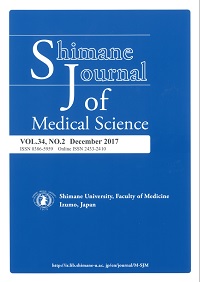Shimane University Faculty of Medicine
ISSN :0386-5959(冊子体)
ISSN :2433-2410(オンライン)


これらの論文は クリエイティブ・コモンズ 表示 - 非営利 - 改変禁止 4.0 国際 ライセンスの下に提供されています。
ダウンロード数 : ? 件
この文献の参照には次のURLをご利用ください : https://ir.lib.shimane-u.ac.jp/5845
Shimane Journal of Medical Science 22 1
2005-03-01 発行
Suppressive effect of epigallocatechin-3-gallate, a constituent of green tea, on platelet-derived growth factor-BB signaling pathway in rat A7r5 cells
ファイル
内容記述(抄録等)
Epigallocatechin-3-gallate (EGCG), a polyphenol constituent of popular beverage green tea, has been recently attracted much attention for the prevention of atherosclerosis, which is a systemic vessel disease and may lead to a variety of diseases including cardiovascular disease. Platelet-derived growth factor (PDGF) plays an important role as cell-proliferating factor in the pathogenic course of atherosclerosis, and increased activity in the PDGF signaling pathway has been implicated as a contributing factor in the progression. In the present study, to elucidate how EGCG affects the PDGF signaling pathway, we investigated the effect of EGCG on the PDGF-BBinduced activation of Ras-MAPK (mitogen-activated protein kinase) pathway, expression of immediateearly genes, and cell proliferation in rat A7r5 cells. EGCG significantly decreased PDGF-BB-induced ERK1/2 (extracellular signal-regulated kinase 1/2) and MEK1 (MAPK/ERK kinase 1) phosphorylation states dose-dependently, and also inhibited PDGFBB-induced c-fos and c-jun mRNA expressions and cell proliferation. Furthermore, PDGF-BB-induced tyrosine phosphorylation of the cognate receptor was significantly suppressed by EGCG, indicating that EGCG may act at and/or downstream the PDGF β-receptor. These results suggest that EGCG may suppress the cell proliferative signaling pathway through the inhibition of PDGF receptor kinase, MEK/ERK activity and immediate-early gene expressions. Thus, the habitual drinking of green tea may be useful to prevent atherosclerosis, and consequently decrease the mortality of cardiovascular diseases.
About This Article
NCID
AA00841586
Other Article
PP. 7 - 11
